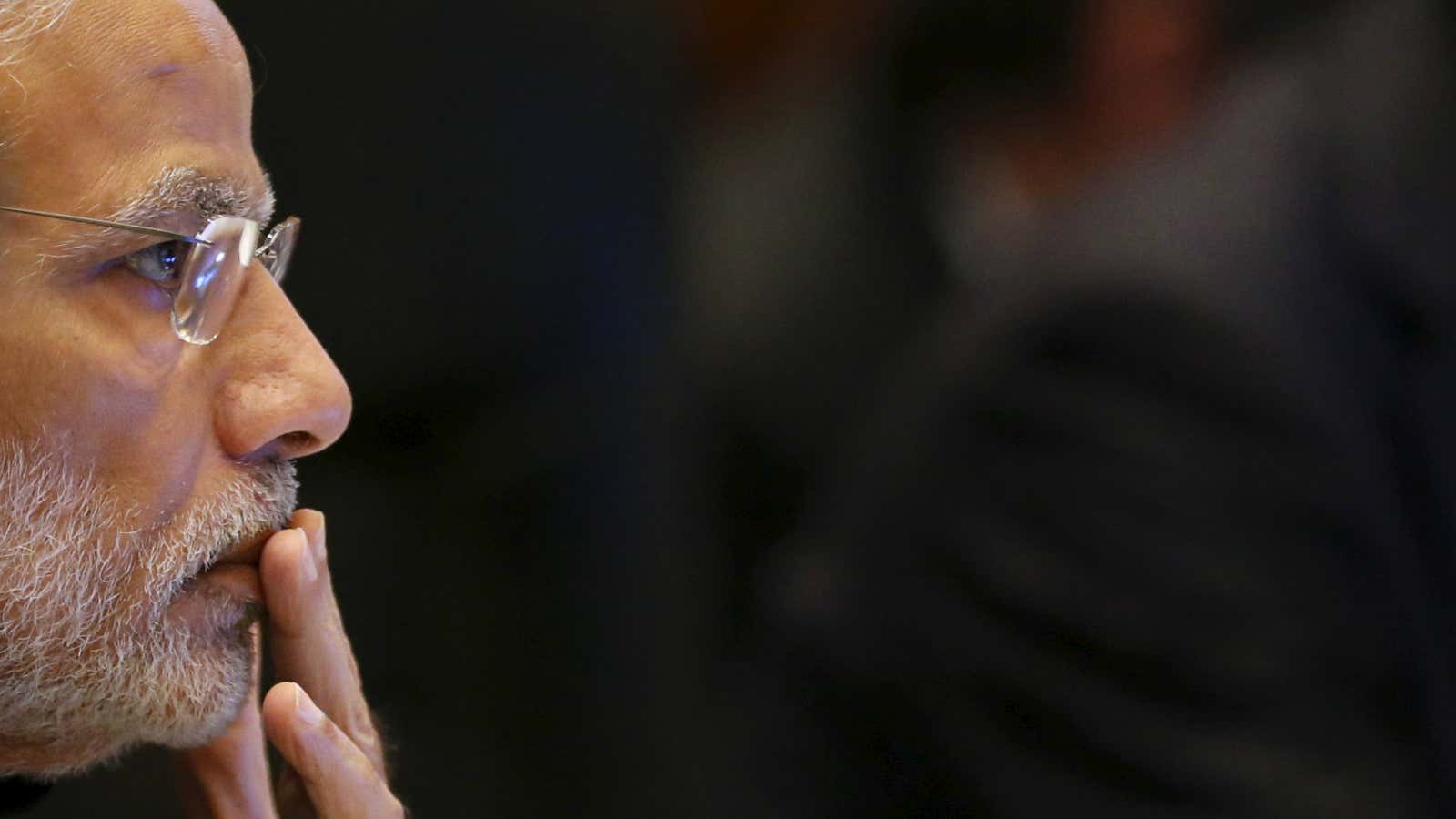When Singaporeans bump into one of the millions of visitors who come to our small island state every year, we’re often curious to hear his itinerary and impressions.
Once in a while, we pick up tips about our own city—it was partly through Indian tourists that many locals discovered the irresistible draw that is Mustafa Centre, Little India’s mega mall. Mainly, though, we wonder if they are getting to know the real Singapore, or some theme park version.
Today’s very important guest prompts similar questions. News reports have told us about the Indian prime minister’s must-do list: make economic connections, plug into Singapore’s capabilities in urban management and skills development, and rally Indian expatriates.
But there is another Singaporean attraction that I wish—though don’t really expect—will make it into Narendra Modi’s travel scrapbook, or his Twitter, Facebook and Instagram feeds.
And that’s Singapore’s religious and ethnic diversity. To admire the city’s 21st-century modernity and overlook how it has dealt with the deep pulls of blood and belief would be to miss the core of its identity. Like the one-of-a-kind orchid that the country offered to name after Modi, Singapore is a delicately tended hybrid.
This achievement is partly down to good fortune. We happen to have a population that is the world’s most religiously plural. No single faith is able to claim the more than half of the public’s allegiance, so none can throw its electoral weight around.
It was also pure luck that Singapore’s first prime minister Lee Kuan Yew was sceptical, even suspicious, of organised religion. But he was also enough of a realist to recognise that many of his citizens would continue to prize their spirituality, no matter how modern and educated they became.
The result is a brand of secularism that treats all religions with respect, but keeps them at arm’s length from the state. Thankfully, it’s not a system of blind neutrality. After all, even seemingly neutral positions—like continuing with the inherited tradition of treating Sunday as the national day of rest, or shaking hands as a standard greeting—may favour one group’s culture over others.
So, there are accommodations made here and there. Traditional Chinese are allowed to burn their offerings on the pavements despite strict anti-pollution rules. Aspects of Muslim family law enjoy official recognition. Eagle-eyed traffic police look the other way when cars are parked illegally outside churches on Sundays and mosques on Fridays. And so on.
Of course, Singapore also has its share of ignorance and insensitivity. There are bound to be misunderstandings and frictions in a densely populated city where people do not have the luxury of mixing only with their own community. As a result, there are compromises to be made by all. The system requires give and not just take.
You will hear Singaporeans complaining about such things. But we also know that whatever adjustments we have to accept, our system will not allow us to suffer deep indignities or cruel injustices. Before people dream of smart cities, they need basic security, and that’s what Singaporeans of all religions are guaranteed.
This is how deputy prime minister Tharman Shanmugaratnam has expressed this aspect of the Singapore dream: “You aspire to the liberty of living in a city that is not defined by its most disorderly elements; you aspire to the liberty of having the opportunity for an education and a job, regardless of your race or social background; and you aspire to a liberty of practising your religion without fear of bigotry or discrimination.”
If this is Singapore, the Indian prime minister’s visit is poignant in two ways, one positive, the other less so.
The first is the debt that Singapore owes to Modi’s predecessors, the founding fathers of the Indian republic. If non-discrimination was programmed into Singapore’s operating system, the source code was written as much by Mahatma Gandhi as by any other architect, local or foreign. This is the legacy that makes a first-generation Singaporean like me treasure the Indian heritage passed on by my immigrant parents.
The second is the gnawing sense that it may be a while before India exercises that same kind of moral leadership again. It cannot, as long as its current government wishes to translate its mandate into majoritarian muscle, with no patience for protecting minorities.
Fortunately, India has the resources and resilience to correct its course. I’ve been fortunate to meet several of its patriots who continue to defend their republic’s values of democracy, secularism and tolerance.
They include civil rights defenders and whistleblowers who have been working in and around Ahmedabad, where the 2002 pogrom against Muslims announced Modi’s cultural vision in his home state of Gujarat. I also know journalists there committed to the difficult task of creating spaces for dialogue in a polarised society. Most awe-inspiring are victims of discrimination and communal violence who refuse to blame their troubles on another’s religion, and understand that all this is just politics gone wrong.
India does not need advice on any of this from Singapore, less than half the size of a Mumbai, Kolkata or Delhi.
So today, Modi will be welcomed with the respect due to the elected representative of the world’s largest democracy.
This irony will be conveniently swept under the red carpet: that his brand of identity politics, if wielded by a Singaporean politician, would not have been tolerated by his hosts. For the larger good, compliments will be exchanged, business done and agreements signed before Modi jets off again.
But the question will linger: if a visitor comes and goes but doesn’t grasp what the place represents, can we really say he’s been there?
Cherian George is a journalism professor at Hong Kong Baptist University. He is the author of Hate Spin: The Manufacture of Religious Offense and its Threat to Democracy, a book about rising intolerance in India, Indonesia and the United States, to be published by the MIT Press in 2016. This post first appeared on www.airconditionednation.com.
We welcome your comments at ideas.india@qz.com.
